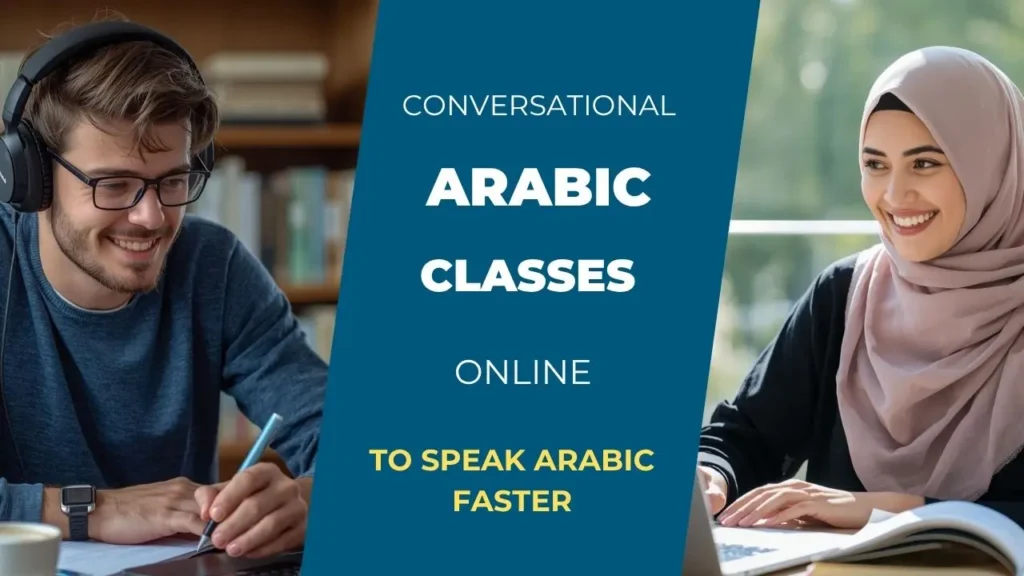Conversational Arabic classes online are changing how people learn to speak. But here’s the real question: are you learning Arabic or just memorizing it? If your goal is to talk with ease, understand locals, and feel confident in daily life, then the right class—and the right method—makes all the difference. So, what should you look for beyond grammar books and slow lessons? Let’s break it down clearly, step by step.
Why You Should Learn Conversational Arabic Online
Studying online gives you flexibility and access to native instructors. You learn useful phrases, natural tone, and clear pronunciation. These courses also build cultural understanding, which makes conversations smoother and more respectful.
What Makes It Worth It?
- It boosts your career. You stand out if you work in business, media, or travel. Speaking Arabic helps you connect with people and close deals.
- It sharpens your mind. Learning a new script and grammar strengthens your memory. It also improves focus and multitasking.
- It builds true connections. When you speak the local dialect, you earn respect. You understand jokes, traditions, and daily life better.
- It helps in daily life. If you live in the Arab world, speaking the language makes everything easier—from shopping to making friends.
Your Best Learning Path
To learn well, choose the method that fits your life. Here’s a quick guide:
| Learning Method | What You Get | Best For |
| Live Online Classes | Teacher support, real speaking practice | Beginners who want clear steps |
| Self-Paced Lessons | Flexible time, watch anytime | Busy learners |
| Self-Study Resources | Low cost through apps and videos | Budget-focused learners |
Tips to Succeed in Conversational Arabic Classes Online
- Join live sessions and ask questions.
- Make mistakes. That’s how you learn.
- Practice daily—even 10 minutes helps.
- Watch Arabic videos or listen to songs to hear real speech.
If you want to improve your brain, career, and connection with others, conversational Arabic classes online are a smart first step. Start today.
Different Dialects and Focuses in Conversational Arabic Classes
Arabic isn’t one language. It’s a group of dialects. Each one changes how you speak, where you connect, and how fast you improve. So, before choosing any online Arabic course, choose the right dialect. That’s your real starting point.
Top Arabic Dialects to Learn First: Choose the Best One for You
Here’s a breakdown of the most common options and how to choose what fits your goals.
Main Arabic Dialects for Conversation
| Dialect | Regions Spoken | Ease Level | Best For |
| Egyptian Arabic | Egypt, but understood across most Arab regions | Easy | General use, media, travel, beginners |
| Levantine Arabic | Lebanon, Syria, Jordan, Palestine | Easy | NGO work, diplomacy, culture, and daily conversation |
| Gulf Arabic (Khaleeji) | UAE, Saudi Arabia, Kuwait, Qatar | Medium | Business, Gulf work, long-term residents |
| Maghrebi Arabic | Morocco, Algeria, Tunisia | Hard | Local use only, suitable for advanced learners |
| Modern Standard Arabic | All Arab countries (formal situations) | Medium | Reading, writing, school, news, religious texts |
How to Choose the Right Dialect
- Where do you plan to live, travel, or work?
Choose based on the country or region. - What is your goal?
For example, if you want to work in Dubai, start with Gulf Arabic. - How fast do you want to speak?
Dialects like Egyptian or Levantine are easier and more common in daily talk. - Do you want to understand media and pop culture?
Egyptian Arabic dominates films and TV across the Arab world.
What the Best Conversational Arabic Classes Online Include
| Focus | Skills You Gain | Why It Helps |
| Speaking | Quick replies | Real talk |
| Listening | Natural speed | Daily life |
| Culture | Tone, gestures | Respectful talk |
| Daily Needs | Shopping, food words | Easy tasks |
| Accent Work | Clear sounds | Better understanding |
How to Choose the Right Arabic Dialect for Real Fluency
Choosing your dialect in Conversational Arabic classes online is not just about language. It shapes how fast you speak, connect, and succeed. Always ask if the course teaches your target dialect, offers real‑life speaking practice, and focuses on daily conversation instead of only grammar. Start with short, frequent sessions. Listen and repeat often. Speak, even with mistakes. Progress comes from real use, not memorizing words. The right dialect brings you closer to true fluency—and turns speaking Arabic into living it.
Who Should Take Conversational Arabic Classes Online?
These classes fit anyone who wants to speak Arabic in real daily life. They help beginners build basic conversation skills. They also work for travelers, expats, business workers, and students living in the Arab world. If you want to talk to locals, understand tone, and use useful phrases, online classes are a smart choice.
How Conversational Arabic Classes Benefit Language Learners
Learning Arabic through grammar books alone can feel slow. Real fluency comes from speaking often, hearing native voices, and learning phrases used every day. Conversational Arabic classes online give you that experience from the first lesson. You speak, listen, and respond in real time, which builds confidence faster than memorizing rules.
Why Speaking Practice Matters
- These classes train your tongue and ear.
- Short drills help you answer quickly.
- With steady sessions, you start to think in Arabic instead of translating in your head.
- Mistakes become part of learning, not something to fear.
Listen to Natural Arabic
- Hearing native instructors teach tone, speed, and rhythm.
- You get used to how people speak in shops, streets, and homes.
- This makes daily conversations easier and more comfortable.
Learn Useful Vocabulary
- You learn words you will use right away. Phrases for markets, directions, greetings, and food orders.
- You also pick up modern slang, so you sound natural, not robotic.
Build Cultural Comfort
- Good classes explain polite forms, gestures, and body language.
- This helps you avoid common social mistakes.
- Knowing when to use certain phrases shows respect and improves your conversations with locals.
Better Memory Over Time
- Short, daily speaking sessions improve recall.
- Repeating words out loud strengthens long-term memory.
- This works better than sitting quietly with grammar notes.
Choose the Right Dialect
- Different regions use different dialects.
- Picking the one that fits your goal saves time and avoids confusion.
Egyptian is popular because of the media. Levantine works well for everyday speech. Gulf Arabic helps in business circles. Maghrebi is mostly local. MSA is formal and not used in daily talk.
What Good Classes Should Include
Look for programs that offer:
- Real conversation drills
- Daily-use vocabulary
- Audio clips from native speakers
- Accent guidance
- Cultural notes
- Short, active sessions
These points help you speak sooner and feel less nervous.
Questions to Ask Before Joining
- Do they teach the dialect you want?
- Will you speak in your first lesson?
- Are sessions short and consistent?
- Do you hear native speakers often?
- Is feedback clear and direct?
More “yes” answers mean better results.
Practical Wins in Daily Life
With conversational skills, you can:
- Ask for directions
- Order food without stress
- Chat politely with locals
- Understand films and short clips
Daily tasks become easier, and travel feels more meaningful.
Career Benefits
Arabic speakers are valued in business, diplomacy, and media. Knowing a spoken dialect builds trust faster than reading knowledge alone. It shows respect and effort, which strengthens relationships.
Smart Learning Tips
Speak out loud often. Listen to short clips daily. Stick to one dialect. Practice even when unsure. Take 15 minutes a day instead of one long session per week. Small steps grow your skills steadily.
Conversational Arabic classes online help you speak sooner, understand more, and connect deeper. They turn passive learning into daily use. With steady practice, clear guidance, and the right dialect, you will feel confident in real conversations. Start small, stay consistent, and enjoy every step.
How to Choose the Best Online Arabic Teacher for Conversation Practice
Finding the right Arabic tutor online isn’t about ratings or price. It’s about fit. Your tutor shapes how fast you speak, how natural you sound, and how confident you feel.
Skip the hype. Focus on real results.
Start with a Clear Goal
Before you click on profiles, ask yourself. Are you learning Arabic for travel, work, or exams? Do you want a specific dialect like Egyptian, Gulf, or Levantine? Is your priority fluency or formal grammar? Your answers guide everything.
Must-Have Qualities in a Conversation Tutor
1. Dialect Specialization
Arabic isn’t one language. It’s many.
- Egyptian Arabic is ideal for media and beginners.
- Levantine Arabic fits daily life and NGO work.
- Gulf Arabic suits business or moving to the UAE or Saudi Arabia.
- Modern Standard Arabic (MSA) works for reading, writing, and official exams.
Ask your tutor: Which dialect do you teach?
2. Real-Time Practice
Look for someone who starts speaking with you in the first class.
They should use:
- Role-playing
- Everyday situations
- Listening drills
Avoid tutors who just lecture.
3. Native or Fluent Speaker
A native speaker gives you:
- Correct pronunciation
- Natural phrasing
- Cultural context
If they’re non-native, check their fluency and teaching background.
4. Feedback and Patience
You need a teacher who:
- Fix mistakes kindly
- Supports without judgment
- Let’s you talk without pressure
Try a trial session. How do they correct you? How do they react when you make a mistake?
What to Ask Before You Book
| Feature | What to Ask | Why It Matters |
| Dialect Focus | Which dialect do you teach? | Relevance to your goals |
| Teaching Experience | How long have you taught? | Patience and clarity come with years |
| Lesson Style | Do you use real-life situations? | Helps you apply language instantly |
| Feedback Style | Will you correct me live? | Keeps your speech clear and accurate |
| Cultural Tips | Do you include social customs?” | Avoids awkward or rude mistakes |
Your Tutor Must Fit You
Don’t settle for high ratings alone. Book a trial. Ask questions. Test their pace. Can they explain things simply? Do they respect your learning style? You should feel heard. That’s when learning becomes progress.
Focus Areas That Matter
| Focus Area | What You Gain | Why It Matters |
| Speaking Drills | Faster replies and a clear tone | Helps in real daily conversations |
| Listening Practice | Better understanding of native speech | Makes talking in shops and streets easier |
| Cultural Notes | Correct polite words and gestures | Builds respect and smoother social moments |
| Accent Training | Clear pronunciation and sound control | Reduces confusion and repeats |
| Daily Vocabulary | Useful words for shopping and travel | You speak with confidence anywhere |
| Short Reply Skills | Quick answers in real time | Fits the natural Arabic speaking style |
Final Advice
- Choose your tutor like you’d choose a coach.
- Focus on dialect, practice, and connection.
- Don’t chase perfection. Chase progress.
You don’t need to speak Arabic like a textbook. You need to speak it like you mean it, and that’s exactly what Conversational Arabic classes online help you do.
Interactive Tools and Resources for Conversational Arabic Learning
Learning Arabic conversation needs more than books. You must speak often and train your ear. Daily review also matters. Fortunately, simple interactive tools make practice easy. They support your conversational Arabic classes online and help you grow with less stress.
What are the best interactive tools for learning conversational Arabic?
The best interactive tools for conversational Arabic are:
- Language exchange apps
- Speech recognition tools
- Audio flashcard apps
- YouTube lessons
- Podcasts
- Live speaking groups
These tools improve listening, speaking, and pronunciation between lessons.
How do language exchange apps help Arabic learners?
Language exchange apps connect you with native speakers. Tandem and HelloTalk are popular choices. You practice real phrases, rhythm, tone, and daily expressions. As a result, you gain natural fluency that books cannot provide.
Which tools improve Arabic pronunciation online?
Speech recognition and voice tools give instant feedback. Mondly and speech-to-text features check tone, stress, and clarity. Therefore, you fix problems early and sound more natural.
Which apps build Arabic vocabulary faster?
Flashcard apps with audio build strong recall. Anki and Memrise use spaced repetition. You see the word, hear it, and repeat it. This simple cycle improves memory.
Are YouTube lessons useful for spoken Arabic?
Yes. YouTube channels teach expressions at a slower pace. Subtitles help you follow a real conversation. As a result, you learn natural rhythm without pressure.
How can live speaking groups improve Arabic fluency?
Speaking groups offer safe practice. Zoom speaking clubs and Discord Arabic rooms help you talk with others. You learn polite phrases, tone changes, and social rules.
Do podcasts help with conversational Arabic?
Podcasts like ArabicPod101 are short and helpful. You can listen anywhere. They train your ear and expose you to real, everyday conversation.
Dialect-Focused Tools
Arabic changes by region. Therefore, choose tools based on your goal
| Tool / Platform | Best Learning Benefit | Ideal Dialects | Why It Helps |
| Drops | Build basic vocabulary fast | Egyptian, Levantine | Simple visuals make new words easy to remember |
| Memrise | Improve listening accuracy | Egyptian, Moroccan | Real audio clips train your ear to native speech |
| TalkInArabic.com | Practice real voices | Egyptian, Levantine, Gulf | Native speakers teach natural tone and phrases |
| YouTube Channels | Hear daily conversation | Multiple dialects | Free lessons show real-life Arabic situations |
| Dialect-Focused Podcasts | Train daily listening | Egyptian, Levantine | Short audio fits busy schedules and builds fluency |
Best Interactive Tools for Conversational Arabic
| Tool Type | What It Improves | Why It Helps |
| Language Exchange Apps | Speaking confidence | You practice real dialogue with native speakers |
| Speech Recognition Tools | Pronunciation clarity | Instant feedback fixes sound and stress mistakes |
| Audio Flashcards | Vocabulary recall | Repetition builds strong word memory |
| Interactive Videos | Listening skills | Visual cues help you follow real speech |
| Podcasts | Daily immersion | Short clips train your ear to natural Arabic |
How should you use interactive tools for Arabic practice?
Even small sessions help. So practice 10–15 minutes daily. Speak aloud. Use new words in simple sentences. Also, record your voice weekly. You will hear progress in tone and speed.
Should you use many Arabic learning apps at once?
No. Too many tools cause stress. Therefore, start with one or two. Add more later. Consistency beats long study hours.
Do learning communities help with Arabic?
Yes. Online groups share tips and free resources. Also, they answer questions fast and keep you motivated.
Finally, Interactive tools help you grow. However, real conversation gives meaning to your progress. Therefore, combine apps, videos, and voice drills with conversational Arabic classes online. With this routine, fluency develops naturally and feels enjoyable.
How much do conversational Arabic classes online cost?
Most online Arabic classes range from $8 to $30 per lesson based on teacher experience, dialect, and schedule. Group classes cost less and offer real conversation practice. Always compare teaching style, not just price.
Summary
conversational Arabic classes online help you build real speaking skills you can use every day. With steady practice, you feel more confident, understand locals faster, and handle daily tasks with ease. Also, choosing a class that matches your goals and teaches your preferred dialect improves your progress. Use short sessions, focus on useful phrases, and listen to native voices often. Visit rahiqacademy.com and join your first lesson today. Your journey starts with one simple step.
FAQ’s
Q:Is learning conversational Arabic online worth it?
A:Yes. You learn real phrases, daily expressions, and clear pronunciation at your own pace.
Q:Which Arabic dialect should I start with?
A:Egyptian or Levantine is easiest. Gulf Arabic helps with business. Choose based on your goals.
Q:How long does it take to speak basic Arabic?
A:With daily practice, most learners speak simple sentences in a few weeks.
Q:Can I learn Arabic online without a tutor?
A:Yes. Apps, videos, and speaking groups help. A tutor speeds progress.
Q:Are conversational classes better than grammar books?
A:Yes. Speaking and listening build real fluency faster than reading rules alone.
Q:Should I learn Modern Standard Arabic or a dialect first?
A:Start with a dialect if you want to speak. Use MSA for reading and writing.
Q:What is the easiest Arabic dialect for beginners?
A:Egyptian Arabic. It’s widely understood and simple to learn.
Q:How long does it take to speak Arabic fluently?
A:With 3–5 sessions per week, expect basic fluency in 6–12 months.
Q:Can I switch Arabic dialects later?
A:Yes. Once you learn one, it’s easier to pick up another.
Q:What is the best site to learn Arabic online?
A:The best sites offer dialect training, live speaking, and flexible schedules. Choose based on your goals.




